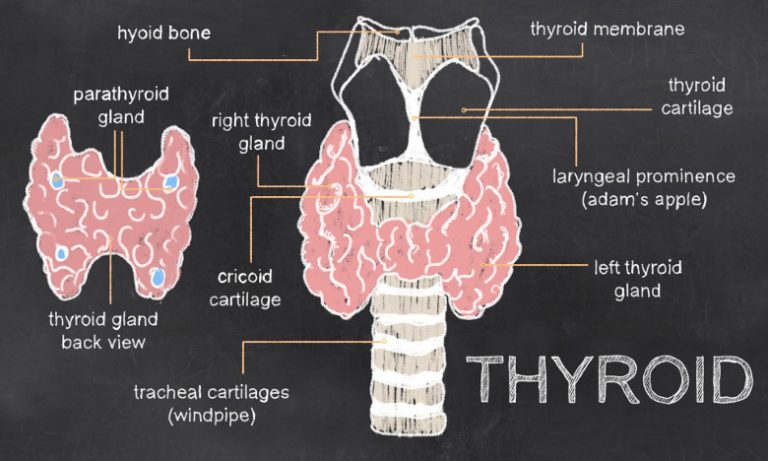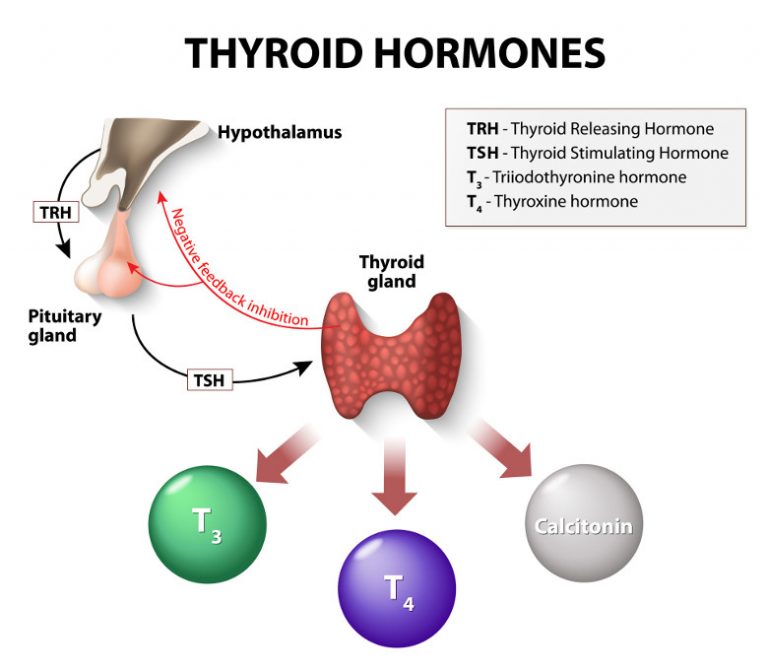Overview and Definition
As one of the glands that comprises the endocrine system, the thyroid is located below the voice box (larynx) and in front of the neck. Measuring approximately 2 inches in length, the thyroid is shaped like a butterfly and consists of two lobes. Through the release of two hormones, namely triiodothyronine (T3) and thyroxine (T4), the thyroid plays a crucial role in regulating metabolism, influencing the way energy is utilized, and impacting almost every organ in the body. Additionally, the secretion of T3 and T4 by the thyroid impacts neurodevelopment, respiration, the nervous system, body temperature, heart functions, cholesterol levels, muscle strength, the menstrual cycle, skin moisture, and weight.

Thyroid disorders then refer to the conditions stemming from the malfunctioning of the thyroid, resulting in conditions that can be classified broadly as hypothyroidism and hyperthyroidism. Hypothyroidism is a condition when the thyroid gland is underactive, making inadequate thyroid hormones for the normal functioning of the body. On the other hand, hyperthyroidism occurs when the thyroid is overactive, leading to an unusually high level of thyroid hormones, more than the amount required by the body.

Causes
While at times, hypothyroidism may be brought about by either excess or insufficient iodine in the diet, or by pituitary disease, the most common cause is still Hashimoto’s disease. Additionally, hypothyroidism may be caused by:
- Inflammation of the thyroid, also known as thyroiditis
- Congenital hypothyroidism that comes at birth
- Surgical removal of part or all of the thyroid
- Radiation treatment of the thyroid
In contrast, where hyperthyroidism is concerned, the most common cause is an autoimmune disorder called Graves’ disease in which the immune system begins attacking the thyroid gland and causing it to produce excessive thyroid hormones. Other causes of hyperthyroidism include:
- Overactive thyroid nodules
- Thyroiditis
- Overconsumption of iodine
- Non-cancerous tumour of the pituitary gland
Symptoms
For many thyroid disorders, diagnosis can be far from straightforward. This is due to the fact that the symptoms of thyroid disorders are often similar to many other medical conditions.
While the symptoms of hypothyroidism differ by person, nevertheless, some of the most common symptoms include:
- Fatigue
- Gain in weight
- Puffiness in the face
- Low tolerance of cold
- Pain in the joints and muscles
- Constipation
- Dry skin
- Thinning hair
- Heavy or irregular menstrual periods
- Infertility
- Depression
- Goiter
Similar to hypothyroidism, the symptoms of hyperthyroidism vary by person, with the most common ones being:
- Irritability
- Nervousness
- Fatigue
- Low threshold for heat
- Sleeping difficulties
- Trembling hands
- Rapid and irregular heartbeat
- Frequent bowel movements or diarrhea
- Loss of weight
- Mood swings
- Goiter
Risk Factors
Certain factors, if present, serve to increase the likelihood of a person developing either hypothyroidism or hyperthyroidism.
Hypothyroidism is more common among females, particularly those who are greater than 60 years of age. Other factors that increase the probability of the onset of hypothyroidism include:
- Previous occurrence of a thyroid problem such as goiter
- Prior surgical procedure done in response to a thyroid disorder
- Radiation treatment on the thyroid, neck, or chest
- Family history of thyroid disorders
- Pregnancy in the previous 6 months
- A female genetic disorder called Turner syndrome
- Sjogren’s syndrome
- Pernicious anaemia
- Type 1 diabetes
- Rheumatoid arthritis
- Lupus
Where hyperthyroidism is concerned, females above 60 years old are likewise more likely to develop the condition, with the risk heightened by the following factors:
- Family history of thyroid disorders
- Pernicious anaemia
- Type 1 diabetes
- Primary adrenal insufficiency
- Elevated intake of iodine
- Pregnancy in the past 6 months
Steps to Take
Individuals experiencing some of the symptoms of thyroid disorder should consult a doctor. Your doctor may ask for your medical history and conduct a physical examination. To confirm the diagnosis of a thyroid disorder, several blood tests are generally required.

The Thyroid-Stimulating Hormone (TSH) test remains the most precise test in the diagnosis of hypothyroidism and hyperthyroidism. Other blood tests that clinicians may recommend to evaluate an individual’s thyroid function include the T3 and T4 tests, the Thyroid-Stimulating Immunoglobulin (TSI) test, as well as the Anti-thyroid Antibody test used to identify the presence of Anti-thyroid Peroxidase (Anti-TPO) Antibodies, Thyroglobulin Antibodies, and Thyrotropin Receptor Antibodies (TRAbs).
Aside from blood tests, doctors may also employ one or more imaging tests for diagnosis purposes and to discover the cause of any thyroid disease. In such cases, an ultrasound, a thyroid scan, and/or a radioactive iodine uptake test may be ordered to aid clinical diagnosis.
Through its nation-wide network of doctors, Quest Laboratories offers a full suite of blood tests for the diagnosis of thyroid disorders. This entails tests for TSH, free T3, free T4, TSI, Anti-TPO Antibodies, Thyroglobulin Antibodies, and TRAbs. When consulting with your doctor about a potential thyroid disorder, enquire about these tests to see if any of them are appropriate for you.

